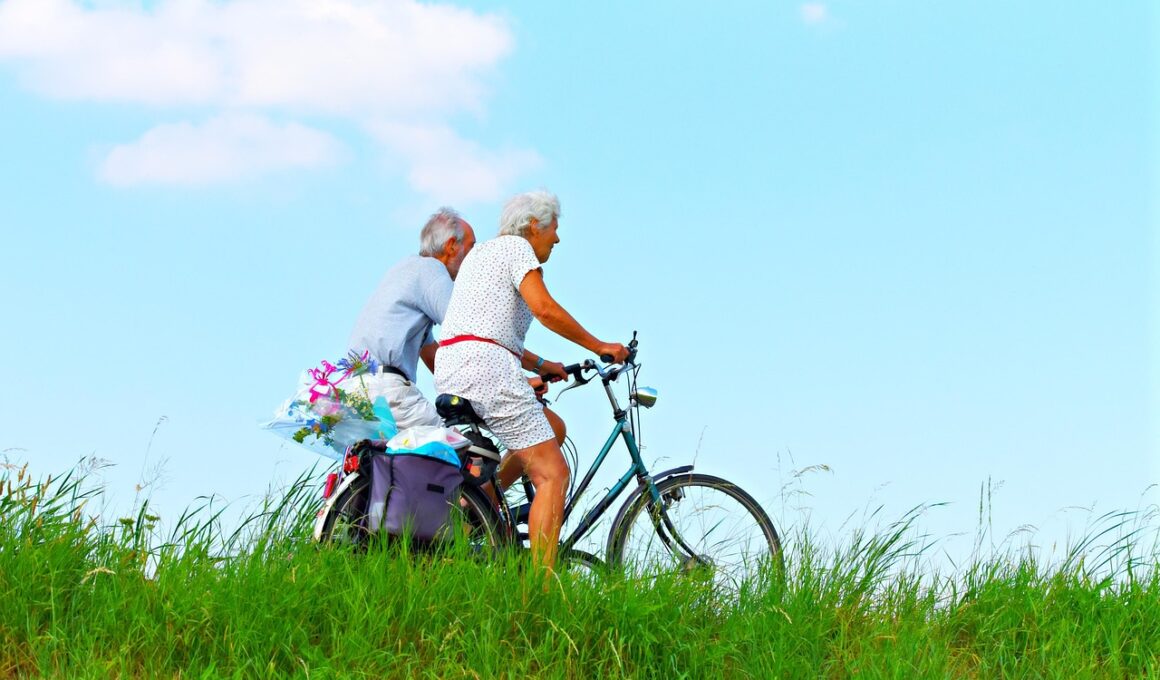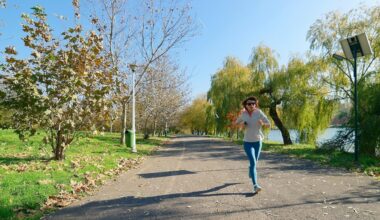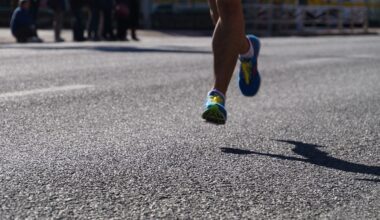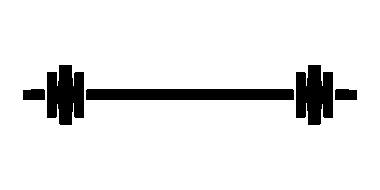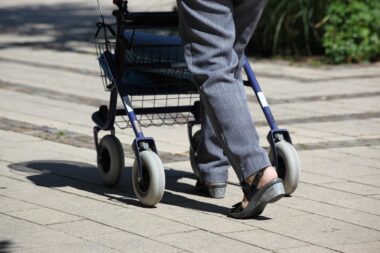Exercise and Immune Function in the Elderly
As we age, our bodies undergo various changes that can impact our immune system. This decline can lead to a greater susceptibility to infections and chronic diseases. Engaging in regular physical activity is crucial for mitigating these effects. Exercise can enhance the immune system’s ability to respond to pathogens, making older adults less vulnerable to illnesses. Notably, the type and intensity of exercise play a vital role in how effectively it can boost immune function. Aerobic exercises like walking, swimming, and cycling improve cardiovascular health, while resistance training helps maintain muscle mass. Together, these forms of exercise foster overall health and support immune responses. Additionally, it is essential to recognize that social engagement through exercise can further bolster emotional well-being, which is closely tied to immune functioning. Practices like group classes can create a sense of community and reduce feelings of isolation, which are common in older populations. As research continues to evolve, the emphasis on exercise as a key component in supporting the immune health of the elderly becomes more pronounced, highlighting its importance as a preventive measure against age-related diseases.
The Benefits of Regular Exercise
Regular exercise offers numerous benefits that are particularly advantageous for elderly individuals. Not only does it contribute to improved balance and coordination, but it also decreases the risks of falls, a significant concern for older adults. These physical benefits translate into enhanced functional mobility, granting older individuals greater independence. Furthermore, exercise plays a crucial role in managing weight and reducing obesity-related health issues. Weight management is essential for preventing diseases such as type 2 diabetes, hypertension, and cardiovascular problems, which are prevalent in this age group. Additionally, engaging in exercise promotes better sleep patterns, which is vital for overall well-being. The mental health benefits are equally impressive, with studies showing that regular physical activity can diminish symptoms of depression and anxiety. This improvement can be attributed to the release of endorphins during exercise, which elevate mood and provide a sense of accomplishment. Therefore, incorporating exercise into the daily routines of elderly individuals enhances not only their physical health but also their mental resilience, improving their quality of life and longevity. The quest for a healthier aging process is increasingly recognized through these proactive lifestyle changes.
One of the most intriguing aspects of exercise for the elderly is its influence on the immune system. Older adults often face a decline in immune function, characterized by an increase in pro-inflammatory cytokines. Regular physical activity can counteract these changes by reducing inflammation and supporting immune response. Research indicates that moderate exercise leads to an improved immune profile, increasing the circulation of immune cells. These cells are crucial for identifying and tackling pathogens effectively. Furthermore, engaging regularly in physical activity can lead to the generation of antibodies, which are essential for vaccine efficacy. Elderly individuals who exercise consistently demonstrate better vaccine responses compared to their sedentary peers. Additionally, the stress-reducing aspects of physical activity can improve immune functioning by lowering cortisol levels that impair immune responses. Thus, exercise provides a significant advantage for maintaining a robust immune system in older populations. Participation in group exercise programs may further nurture social interactions, amplifying emotional health, which indirectly supports immune processes. Given the interconnection between physical activity and immune system health, encouraging elderly individuals to remain active is paramount for their overall wellness.
Types of Exercises Beneficial for the Elderly
When considering optimal exercise types for enhancing immune function among seniors, both aerobic and resistance training are paramount. Aerobic exercises include activities like brisk walking, swimming, and cycling, which have been shown to elevate heart rates and improve overall endurance. Engaging in these activities regularly fosters cardiovascular health and supports efficient blood circulation. Resistance training, on the other hand, focuses on strengthening muscles and maintaining bone density. Activities such as weight lifting or using resistance bands help counteract age-related muscle loss, also known as sarcopenia. This preservation of muscle mass is essential for sustaining mobility and functional independence. Furthermore, flexibility and balance exercises, including yoga or Tai Chi, can enhance physical stability and prevent falls, providing additional safety benefits. The combination of these exercise types creates a comprehensive fitness routine, offering both physical and immune support to elderly individuals. It’s vital for seniors to find activities they enjoy to encourage long-term adherence to these exercise regimens. Therefore, mixing different exercise types can keep routines engaging while reaping incredible health benefits, significantly impacting their immunity and overall quality of life.
Nutrition also plays a complementary role alongside exercise in bolstering the immune function of the elderly. A balanced diet rich in essential nutrients can optimize the physiological benefits gained from physical activity. Nutrients such as vitamins C and D, zinc, and omega-3 fatty acids are known for their immune-boosting properties. Combining regular exercise with nutritional support helps prevent deficiencies that can compromise health. Studies indicate that older adults who maintain an active lifestyle and consume a nutritious diet experience greater immune resilience and lowered risks of infections. Hydration also significantly affects exercise performance and recovery, particularly for the elderly, as dehydration can impair physical capabilities. To ensure the best outcomes, seniors should integrate various food sources rich in antioxidants and beneficial fats into their meals. This balanced nutritional profile not only aids in immune function but also supports recovery from exercise and enhances energy levels. Hence, promoting a harmonious relationship between exercise and nutrition can equate to an improved health outcome for older individuals. Regularly consuming nutrient-dense foods fuels their bodies, helping them stay active and energized for daily challenges.
Barriers to Exercise in the Elderly
While the benefits of exercise for the elderly are widely recognized, several barriers can hinder their ability to stay active. Physical limitations, including chronic pain or mobility issues, can make participation in exercise daunting. Overcoming these challenges often requires tailored programs that accommodate their specific needs while also being motivating. Lack of access to safe spaces for exercise, especially in urban areas, further exacerbates this issue. Social isolation can deter elderly individuals from exercising, as they may prefer group settings for motivation and support. Education about the importance of exercise is crucial, as many may not understand its benefits. Furthermore, fear of injury and a lack of confidence may prevent some elderly individuals from attempting new exercise regimes. Addressing these barriers requires a multifaceted approach involving community support, programs designed for older populations, and wellness education initiatives. Encouraging partnerships with healthcare professionals can also help develop personalized exercise plans that suit individual capabilities. By actively working to remove these hurdles, we can pave the way for an improved uptake of exercise among the elderly, ultimately leading to healthier, more engaged lifestyles.
In conclusion, the relationship between exercise and immune function in the elderly is a dynamic and vital aspect of healthy aging. Regular physical activity not only enhances immune responses but also fosters overall physiological and psychological health. The combination of aerobic, resistance, flexibility, and balance exercises creates a well-rounded fitness regime that can sustain functional independence. By addressing barriers to exercise and promoting nutrition alongside physical activity, we facilitate a comprehensive approach to elder health. Ongoing education and community engagement are paramount in fostering an active lifestyle for older adults. Research supports that seniors who exercise regularly enjoy a markedly improved quality of life while experiencing lower rates of chronic diseases. Thus, integrating exercise into daily routines is essential for older populations, highlighting the need for accessible programs and resources that inspire participation. As society advances, it becomes increasingly important to emphasize the positive impacts of exercise on longevity and wellness. Ultimately, empowering the elderly to embrace physical activity can yield significant benefits, enhancing their lives and ensuring healthier aging.
Understanding the vital role of physical activity in enhancing health and immune function among the elderly is fundamental. Continuous engagement in exercise routines can lead to lifelong benefits, fostering independence and promoting a better quality of life. As public health initiatives prioritize older adult fitness, it is essential to create inclusive environments that encourage ongoing participation. This promotes favorable outcomes for not only individual health but also the community at large. By streamlining access to resources like group classes, training programs, and educational workshops, we can empower older individuals to prioritize their health. Connecting with local organizations focused on elder fitness ensures that supportive networks are always available. Additionally, using technology like fitness apps can motivate teens, as they can track their progress while enjoying activities. Thus, integrating modern solutions has the potential to enhance overall community engagement. As we delve deeper into the interconnection between exercise and comprehensive health for seniors, let us champion this critical message. Providing information and flexibility in how older individuals experience exercise will further reduce barriers and challenges. Prioritizing exercise will lead to healthier lifestyles and active living for our aging population.
